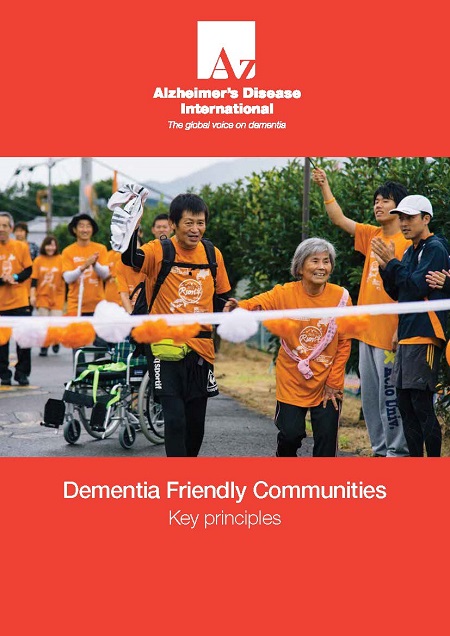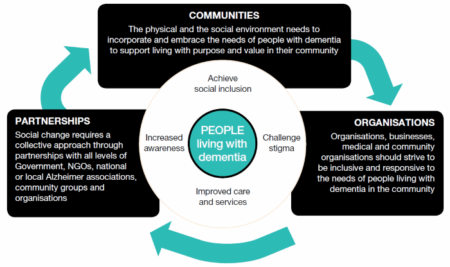It seems a little strange to hear “Dementia Friendly Community” after working on this month’s VOICES with Dementia column featuring Helga Rohra. She asks (paraphrased), “What if we said, ‘Cancer Friendly Communities’?” Munich-based Ms. Rohra delivered the Keynote Address on the second day of the Alzheimer’s Disease International World Conference in Budapest last month. [You may view her speech by clicking on the link at the end of this article.]
 It sounds a bit strange, doesn’t it?
It sounds a bit strange, doesn’t it?
Why do we have to call attention to a community being “friendly?”
It makes sense when we consider the English language is primarily a bipolar language. We speak and write in terms of yesses and no’s or blacks and whites. We have few words that qualitatively describe the in-betweens of two extremes.
When we hear or read a phrase including the word “friendly,” our language compels us to inquire about the opposite, or UNfriendly” communities.
Lest you feel that I’m making a big deal out of a small issue, consider that the words we choose to use either perpetuate or destroy (there’s that bipolar language, again) the stigma of dementia.
Shouldn’t all dementia communities be concerned about the health and emotional welfare of their residents?
It’s like having a sign posted on a Walmart or Costco that reads: Cancer Survivor Friendly Shopping.
Targeting a group of people in this context stigmatizes.
In fact, it’s downright unnerving.
When I see this – and English is my second language – I wonder if there was a problem. Were people with dementia abused and neglected? Did they die as a result of unfriendly treatment?
During the past half-decade, policy leaders, community developers, caregivers, and even organizations serving people with dementia have been taking major steps forward. They’re inviting feedback from the very people they serve.
Hear the VOICES with Dementia
 If we actively seek representation on our committees and even boards by people with dementia and then really listen, we’ll insure initiatives better represent their needs.
If we actively seek representation on our committees and even boards by people with dementia and then really listen, we’ll insure initiatives better represent their needs.
As recent as 20 years ago, few were willing to speak. Today, people with dementia participate in forums, group meetings, write blogs, and even books. Some participate in webinars, on panels and even give speeches. By hearing about their experiences, needs, and concerns, we gain awareness. Their voices also help reduce the stigma.
The graphic pictured here, courtesy of Alzheimer’s Australia, emphasizes the need to include people with dementia. By doing so, we value the varying levels of contributions people make while living with dementia. Instead of casting them aside, we help them satisfy the universal human need we all share – to feel our lives have a purpose. [The link to enlarge the image is at the end of this article.]
Instead of using words that may feel right for us – what can be wrong about the word friendly – let’s consider the context and different people’s perspectives.
Instead of announcing that we’re being “friendly”, we should just be “friendly.” When this is a priority at the highest levels, it will filter down to the front lines of care. Our actions will speak louder than our words.
For additional Information, please click on the following links.
Alzheimer’s Disease International’s overview page on Dementia Friendly Communities
Click on the cover image at the top to download the 16-page PDF document on Dementia Friendly Principles.
Alzheimer’s Australia’s 7-page PDF document – Dementia Language Guidelines 2014 [TCV Update 9/30/2022: URL updated]
Helga Rohra – The Caregiver’s Voice Featured VOICE with Dementia









The Dementia Friendly Communities make a bold statement to the community that support and understanding for people with dementia is a priority. These initiatives do more than provide support for the individuals with cognitive loss. They provide much needed assurance to caregivers that they and their loved ones will be welcomed in the community with warmth, patience, understanding, and compassion. They also educate businesses and the general public. The choice of words should not be the focus. The actions that result from a community’s decision to become dementia friendly are what really matters. I was a caregiver for my mother who had Alzheimer’s Disease. Like Joy, I am also a cancer survivor. The two are very different. Throughout my cancer experience, I was always able to voice my needs and communicate clearly with people. My mother was not.
We often experienced the kindness of strangers, for which we were extremely grateful. I remember very well a couple of restaurants that were “Dementia Friendly” in the 1990’s, before there was a name for it. We knew that these two restaurants could be counted on to give a warm welcome. I can speak from experience that knowing there were “friendly” places to go helped reduce stress and made a big difference in how long we were able to care for her at home.
Mary Hanson, Director
Verona Senior Center
Thank you, Mary.
I appreciate the emphasis you place on ACTIONS: The actions that result from a community’s decision to become dementia friendly are what really matters.
WOW and those restaurants… seem like they were run by open-minded folks who put people first, regardless of condition.
Finally, thank you for adding your experience with cancer as well as caring for your mom with Alzheimer’s disease.
I’ve seen some of these discussions and have definitely given them some thought when proceeding forward with this initiative. I think dementia is a very different issue from cancer. Having had cancer I understand that being physically ill is different from having a cognitive illness that changes your thinking, your actions, your personality and your behavior. We know we can fight cancer and this is empowering. We cannot fight Alzheimer’s. We may be able to slow it down, but we can’t cure it.
I know semantics are important but we need to look beneath the terminology and consider that this is more than just being friendly, it’s about understanding what it’s like for a person with dementia. It’s helping the lay person consider this…and for a moment, “walk in their shoes.” Yes, we should be friendly to everyone, but I believe people who are affected by dementia, whether living with it, or caring for someone with it, deserve a little more “friendliness” as well as compassion and understanding.
Thank you for sharing the article. It’s important for us to know what the people who disagree with this concept are saying so we can think about whether this is a worthy cause or not. For me and many caregivers and people with dementia that I speak to, they are thrilled that we are bringing this issue into the light for all to see and understand.
Joy Schmidt
Dementia Care Specialist- Aging & Disability Resource Center of Dane County Wisconsin
Joy, thank you for taking time to consider the semantics issue and welcoming alternate views to build awareness of how we talk about dementia.
As you noted in your thought-provoking commentary, based on your own experience with cancer and working with people with dementia and their caregivers, our terminology affects how we perceive.
More importantly, your advice about understanding and “walking in their shoes” is critical in order to truly be “friendly.”
Again, thank you, Joy. It’s important to keep our dialogue open in order to raise awareness and reduce the stigma.
Let us be committed in providing exceptional home care services and offering a personal touch that enriches the lives of those for whom we care.
I raise a glass in to a toast of agreement with you, Sue Ann! 🙂